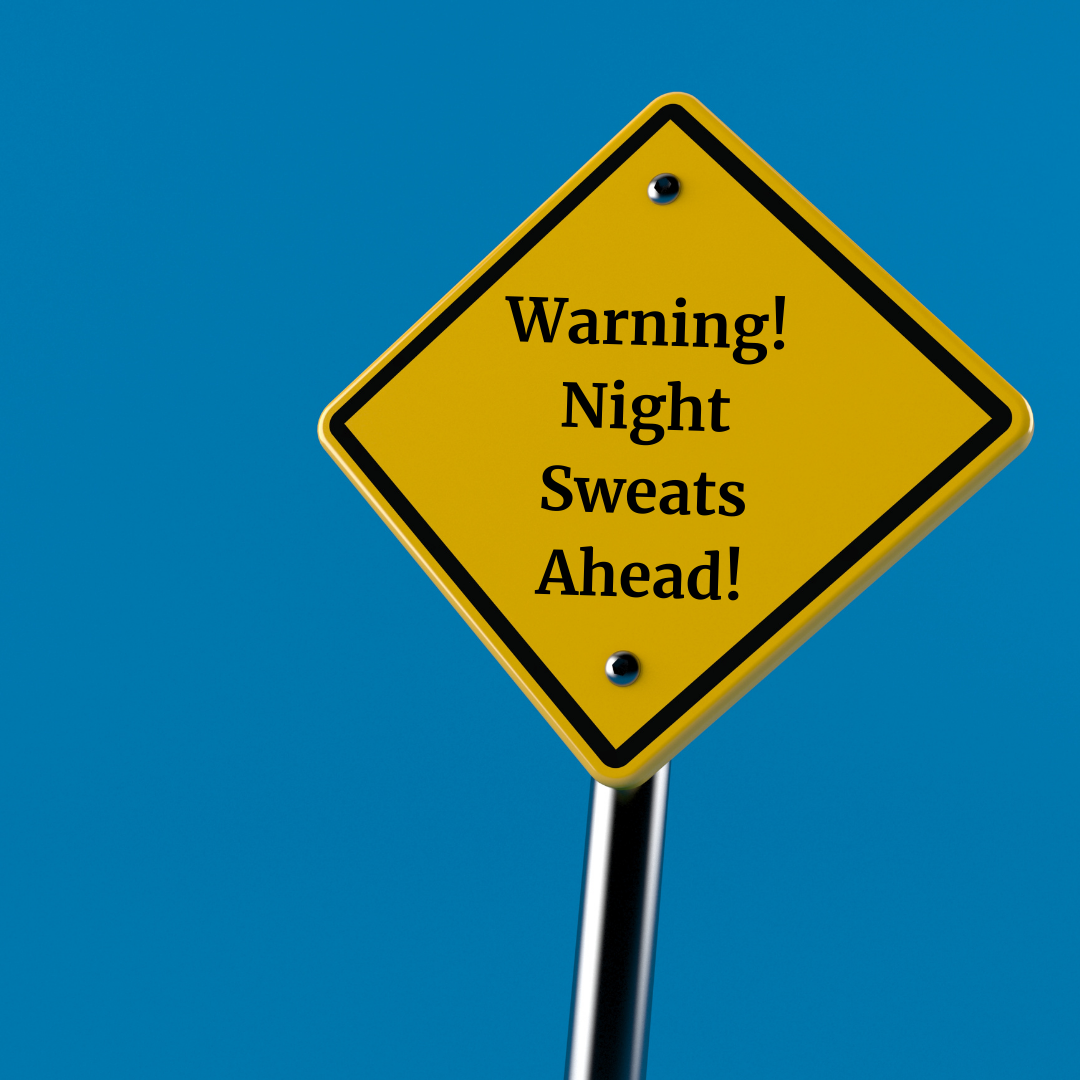
Why Do (Bad) Night Sweats Happen To Good Women?
Share

(update December 8 2023)
Night sweats. They make you hot, then cold. They make you clammy. They wake you up just as you’re drifting off – again. Your sheets are soaked, you’re soaked. You have to change in the middle of the night – and once you’ve changed, you’re wide awake.
And while you’re wide awake, staring at the ceiling, you’re wondering, “Is it cancer? A thyroid condition? I used to be such a good sleeper. There’s a crack in the ceiling. I have to call the repairman. Is the ceiling going to cave in? I should change that statistic in the presentation. I think we’ll have pasta for dinner tomorrow …”*
In all likelihood, your night sweats are menopausal hot flashes at night. That’s right – you’ve reached the special life stage – perimenopause, menopause or even post-menopause when night sweats are common.
Approximately 75% of all women experience some form of night sweats or hot flashes. For most women, they don’t last long – a few weeks to a few months. For the few lucky ones out there (myself included), they can last a year or longer (I’m in year three of night sweats).
What are Night Sweats?
Night sweats are hot flashes (or hot flushes) that occur while you are sleeping. The difference between those that happen during the day and those at night is that nighttime hot flashes disrupt your sleep. In fact, studies have shown that night sweats will compound any insomnia problems you already have (isn’t that great news?).
The biological trigger, according to Christiane Northrup, is that as we age and our estrogen and progesterone levels decrease, an imbalance between the two causes improper functioning of your internal thermostat. It decides that you are in need of cooling down whether you actually need to or not.
So, your body starts to go into action to lower your core temperature by pushing blood to your extremities (causing flushing) and opening sweat glands. You suddenly get very warm and need to take off a layer or two. Then, as it subsides your body temperature plummets before it goes back to normal. Women can experience this cycle once in a while to 4 times or more per hour. Everyone is unique and their hot flashes are too.
The problem with night sweats versus hot flashes is that you’re not awake when they occur - or, at least, you're not supposed to be awake. But, with the never-ending cycle of hot then cold flashes, you are constantly having to throw your covers off or pull them back on, keeping you awake whether you like it or not.
Worse, if you're exhausted or in the deep sleep phase, you may not wake up during these hot flash periods. In that case, your sweat will be absorbed by your sleepwear (or bedding if you sleep in the nude), and your covers will trap the heat you’ve just given off.
The heat condenses, so you’re now doubly soaked – both by your sweat and the heat your body has given off that’s condensed into moisture.
If you haven’t woken up at this point, at some point you will, and it may be from a dream in which you are swimming through a flooded bedroom, or a storm or some other dark and water-related situation.
I paint a pretty depressing picture, I know. I’m speaking from personal experience about why oh why this happens to we innocent victims who are just minding our own business.
Get Your Night Sweats Under Control So You Can Sleep
The good news is, you have more control of your night sweats than you might think.
After doing a lot of research on the mechanics of night sweats and hot flashes, I discovered that my night sweats were largely triggered by my actions before bed, what I ate and drank, and my sleeping environment.
I decided to use a form of a migraine journal to track night sweats. Once I identified my main triggers, I adjusted everything from when I drank chamomile tea (for me, an hour before bed or longer), to avoiding spicy foods and red wine at dinner.
I created our moisture-wicking sleepwear especially for menopause-related night sweats. Our sleepwear responds to changes in body temperature and moisture so you can get the restorative sleep you need.
If you suffer from night sweats and are at your wit’s end, take heart: you do have a certain amount of control over them - for some, it may not be much, but even a little lessening in their severity can help you get more sleep.
While menopause likes to throw everything it has at us (especially if you are as unprepared as I was), you have the ability to lessen the consequences of hot flashes and night sweats by adjusting diet, exercise and even types of sleepwear and bedding.
We have a night sweats tracking journal to help you keep track of possible triggers, and, of course, our very comfortable nightgown that gives you superpowers so you sleep better.
If you have suggestions for lessening night sweats or hot flashes, please feel free to leave your suggestions in the comments section.
Thanks for reading!
*If you are concerned about your night sweats you should seek professional help to rule out the more serious causes of night sweats such as cancer and thyroid problems.
Recommended reading: The Wisdom of Menopause, by Christiane Northrup; The Menopause Manifesto, by Jen Gunter
Disclaimer: The information provided in this blog post is for educational and informational purposes only. It does not constitute medical advice and should not be used as a substitute for professional medical expertise, diagnosis, or treatment. Always seek the advice of your physician or qualified healthcare provider regarding any questions you may have regarding a medical condition or treatment.
